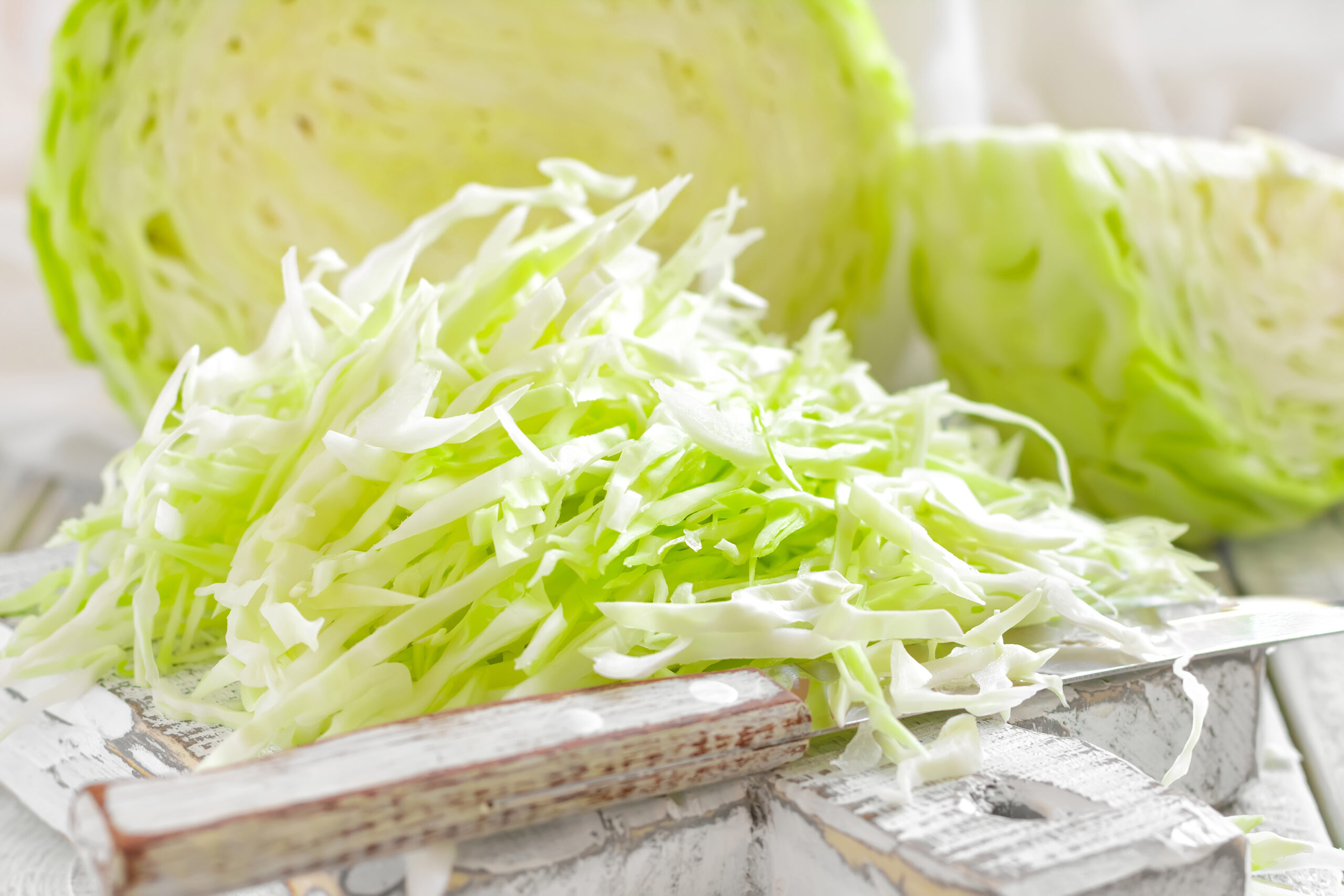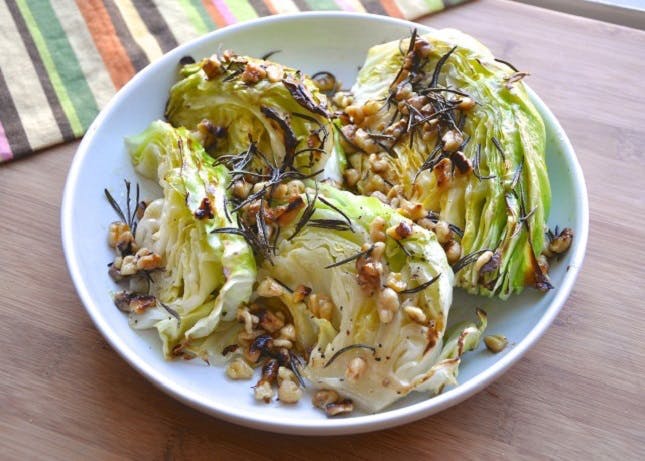

One of my clients told me how she put a couple of whole cabbages over a hot grill, and left them there, turning every few minutes until they looked charred and burnt! So I tried it – and trust me; it makes for a slaw that goes with almost anything grilled.
Eastern View: Cabbage can provide you with some special cholesterol-lowering benefits if you steam or cook it. The fiber-related components in cabbage do a better job of binding together with bile acids in your digestive tract when they’ve been cooked. When this binding process takes place, it’s easier for bile acids to be excreted, and the result is a lowering of your cholesterol levels. Raw cabbage still has cholesterol-lowering ability, just not as much as cooked cabbage.
As a nutritional powerhouse, ” cabbage is very rich in anti-oxidant vitamins and a compound called indole-3-carbinol, which is said to both inhibit and cleanse carcinogens, thus making cabbage a potent detoxification food. ” It is also quite low in calories, yet high in dietary fiber; it is also a healthy choice for those on a diet to lose or maintain weight.
It is a brain food! It is full of vitamin K and anthocyanins that help with mental function and concentration. These nutrients also prevent nerve damage, improving your defense against Alzheimer’s disease, and dementia. Red cabbage has the highest amount of these power nutrients. High in sulfur, the beautifying mineral. Cabbage helps dry up oily and acne skin. Internally sulfur is essential for keratin, a protein substance necessary for healthy hair, nails, and skin. Cabbage helps detoxify the body. The high content of vitamin C and sulphur in cabbage removes toxins (free radicals and uric acid); which are the main causes of arthritis, skin diseases, rheumatism and gout.
Cabbage helps keep blood pressure from getting high. The high potassium content helps by opening up blood vessels, easing the flow of blood. And lastly cabbage is an anti-inflammatory and blood sugar regulator. The natural red pigments of red cabbage (betalains) is said to lower blood sugar levels and boost insulin production. Of course it has no white sugars and very few simple sugars. Betalains have powerful anti-inflammatory properties just like beets.
Cabbage Caution: Those with thyroid problems should avoid eating large amounts of cabbage. It may interfere with the body’s absorption of iodine, needed by the thyroid gland. This applies to all cruciferous vegetables.
Western View: Red cabbage’s primary characteristics — its red hue and bitter, peppery flavor — signify that you’re getting two types of cancer-preventing substances. The red pigment comes from plant-based chemicals called flavonoids, while the sharp flavor is the result of sulfur-based compounds. In addition to these important phytochemicals, cabbage contributes to your overall health with fiber and a range of vitamins and minerals.
One cup of chopped red cabbage has 28 calories, .1 gram of fat and 1 gram of protein. You’ll get 2 grams of dietary fiber, which is 5 percent of the recommended daily intake for men and 8 percent for women. Insoluble fiber from red cabbage prevents constipation, lowers the risk of developing diverticular disease and helps relieve the symptoms of some gastrointestinal conditions, such as irritable bowel syndrome.
The best-known sources of vitamin C are citrus fruits, so it may be a surprise to learn that 1 cup of chopped red cabbage has 56 percent of the recommended daily intake of this important vitamin. As an antioxidant, vitamin C fights inflammation and protects cells from damage that leads to chronic health conditions, such as heart disease. Your body needs vitamin C to make collagen, which is the connective tissue that gives structure, strength and support to muscles, skin, bones and other tissues throughout the body. Collagen is also essential for the process of healing wounds. Vitamin C also strengthens the immune system by stimulating the production of white blood cells that fight invading bacteria and infections.
Vitamin A actually refers to more than one nutrient. Even though all the different forms of vitamin A contribute to healthy eyes and vision, they have different roles. One cup of red cabbage contains 33 percent of the recommended daily intake of vitamin A, but the total is delivered in three different forms: beta-carotene, lutein and zeaxanthin. Beta-carotene is converted into the form of vitamin A called retinol that’s used by cells in the eyes that detect light and convert it into nerve impulses. Lutein and zeaxanthin function as antioxidants that protect the retina and may help prevent age-related macular degeneration.
It takes a series of chemical reactions to make blood clot. Seven proteins that participate in blood clotting depend on the presence of vitamin K to complete their part of process. Other vitamin-K-dependent proteins regulate bone mineralization. Long-term deficiency in vitamin K increases the risk of developing osteoporosis, atherosclerosis and cancer, according to research published in the April 2012 issue of “Food and Nutrition Research.” You’ll gain 28 percent of the recommended daily intake of vitamin K from 1 cup of chopped red cabbage.
Red cabbage belongs to the cruciferous, or Brassica, family that includes broccoli, turnips and Brussels sprouts. Cruciferous vegetables are the only source of sulfur-containing compounds called glucosinolates that are responsible for their bitter flavor. Glucosinolates are digested into isothiocyanates that reduce inflammation and fight bacteria.
The red pigment comes from a flavonoid, cyanidin, that functions as an antioxidant. Both cyanidin and the isothiocyanates prevent some types of cancer by stopping the growth of cancer cells, inhibiting enzymes that activate carcinogens and helping cells repair damage caused by carcinogens. In April 2012, Vanderbilt University Medical Center released research results showing that breast cancer survivors who ate more cruciferous vegetables reduced their risk of dying by 62 percent.
Hot Grilled Cabbage Slaw
Ingredients:
1 small purple cabbage
1 small green cabbage
1 small bunch cilantro, the leaves cleaned and roughly chopped, approximately ½ cup
1 cup buttermilk, or to taste
1 tablespoon freshly squeezed lime juice, or to taste
1 tablespoon adobo from a can of ‘chipotles en adobo’, or hot pepper sauce to taste (optional)
Kosher salt and freshly ground black pepper, to taste
Directions:
When you are ready to make the slaw, set one burner of a gas grill to high. When its ready, place the cabbages, whole, onto the grill and allow them to roast in the heat of the open flames, turning them every few minutes and allowing them to rest occasionally on the cooler side of the grill, until they are blackened, blistered and a little soft to the touch, approximately 30 to 45 minutes. You will discard most of the burned exterior.
Meanwhile, make the dressing. Whisk the cilantro into the buttermilk in a bowl, and add the lime juice and, if you’re using, adobo or hot sauce to taste, along with a little salt and pepper.
When the cabbages are blackened and have softened to the point where you can insert a knife into each one fairly easily, remove them to a cutting board. Once they have cooled slightly, take off most of the blackened exterior leaves. Cut each cabbage in half, then use your knife to remove the cores. Slice the cabbage into thin strips, as for a coleslaw, and add them to a large serving bowl.
Apply about 1/2 a cup of the buttermilk to the sliced cabbage, and toss to combine. Continue adding buttermilk until you have enough to coat all the cabbage, then taste and adjust seasonings.
Serve with your favorite grilled burger or chicken.
Want more meals that are not only good but good for you?! Take the Modern Dosha Quiz to discover your dosha and receive health, diet and lifestyle recommendations based upon your answers!
In health,

The Holistic HIghway integrates traditional Western medical practices with Ayurveda medicine, creating a focus on prevention through nutrition, diet, and exercise; use of the latest genetic testing and other diagnostic techniques; and prescribed combinations of botanical medicines, supplements, therapeutic diets, detoxification programs, or stress-management techniques.

Integrative Health Expert | Ayurveda Practitioner | Author | Speaker
Kerry is a globally recognized leader in integrative medicine and the science of health known as Ayurveda. She is passionate about raising awareness of the need for a change in contemporary medicine that focuses on patient empowerment and a health-based (rather than disease-based) medical system.
Kerry is connected with The University of Pittsburgh Center for Integrative Medicine and remains a pioneer in the field of integrative medicine where she has developed a personalized system to manage chronic disorders by incorporating fundamental changes in diet, behavior, and stress while focusing on genetics.
This individualized program is so successful that many of her clients have achieved maximum healing and vitality after years of chronic problems!
More to Explore
Contact
Disclaimer
The sole purpose of all the website content is to educate and provide information about Integrative Health, Genetics and Ayurveda.This information is not intended for use in the diagnosis, treatment, cure. or prevention of any disease.
Stay Connected